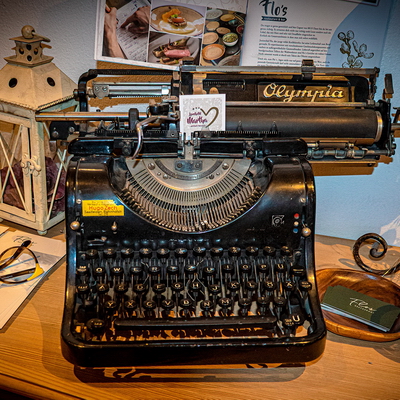
|
 Writer Officina Blog
Writer Officina Blog 
|
  Manuale di pubblicazione Amazon KDP. Sempre più autori
emergenti decidono di pubblicarse il proprio libro in Self su Amazon KDP,
ma spesso vengono intimoriti dalle possibili complicazioni tecniche. Questo
articolo offre una spiegazione semplice e dettagliata delle procedure da
seguire e permette il download di alcun file di esempio, sia per il testo
già formattato che per la copertina.
Manuale di pubblicazione Amazon KDP. Sempre più autori
emergenti decidono di pubblicarse il proprio libro in Self su Amazon KDP,
ma spesso vengono intimoriti dalle possibili complicazioni tecniche. Questo
articolo offre una spiegazione semplice e dettagliata delle procedure da
seguire e permette il download di alcun file di esempio, sia per il testo
già formattato che per la copertina. |
  Self Publishing. In passato è stato il sogno nascosto
di ogni autore che, allo stesso tempo, lo considerava un ripiego. Se da
un lato poteva essere finalmente la soluzione ai propri sogni artistici,
dall'altro aveva il retrogusto di un accomodamento fatto in casa, un piacere
derivante da una sorta di onanismo disperato, atto a certificare la proprie
capacità senza la necessità di un partner, identificato nella
figura di un Editore.
Self Publishing. In passato è stato il sogno nascosto
di ogni autore che, allo stesso tempo, lo considerava un ripiego. Se da
un lato poteva essere finalmente la soluzione ai propri sogni artistici,
dall'altro aveva il retrogusto di un accomodamento fatto in casa, un piacere
derivante da una sorta di onanismo disperato, atto a certificare la proprie
capacità senza la necessità di un partner, identificato nella
figura di un Editore. |
  Scrittori si nasce. Siamo operai della parola, oratori,
arringatori di folle, tribuni dalla parlantina sciolta, con impresso nel
DNA il dono della chiacchiera e la capacità di assumere le vesti
di ignoti raccontastorie, sbucati misteriosamente dalla foresta. Siamo figli
della dialettica, fratelli dell'ignoto, noi siamo gli agricoltori delle
favole antiche e seminiamo di sogni l'altopiano della fantasia.
Scrittori si nasce. Siamo operai della parola, oratori,
arringatori di folle, tribuni dalla parlantina sciolta, con impresso nel
DNA il dono della chiacchiera e la capacità di assumere le vesti
di ignoti raccontastorie, sbucati misteriosamente dalla foresta. Siamo figli
della dialettica, fratelli dell'ignoto, noi siamo gli agricoltori delle
favole antiche e seminiamo di sogni l'altopiano della fantasia. |
|
|
|
|
|
|
Conc. Letterario
|
|
|
|
Magazine
|
|
|
|
Blog Autori
|
|
|
|
Biblioteca New
|
|
|
|
Biblioteca Gen.
|
|
|
|
Biblioteca Top
|
|
|
|
Autori
|
|
|
|
Recensioni
|
|
|
|
Inser. Estratti
|
|
|
|
@ contatti
|
|
|
Policy Privacy
|
|
 Anna (English Version )
Anna (English Version ) 
|

 "No one can prevent you from dreaming, because no one has the power to exceed the threshold of our mind, and when we dream, we are free. And when we wake up, if we are forced to confront a difficult reality we must remember to always look, even with painful stubbornness for good reasons to try and forget or hide from our selves the bad that agonizes us and to always walk with courage even if we must do it against our will. They say that human beings do not always hide the day that their mothers brought to them light...At times life compels one to be reborn many times over. If I close my eyes and remember my past, my loves, my sorrows, my joys, I dream and often cry. It is a sensation of a wonderful tender sentiment, that gives me goose pimples. At times it's agonizing, melancholic and a sense of bewilderment, but I reawaken immediately because I know that the past has a certainty: it happened. That what has happened cannot be modified or changed. The past has its usefulness: and serves me to be who I am today. I took decisions that I was afraid of, that brought against me storms and lightning. But I always decided...
"No one can prevent you from dreaming, because no one has the power to exceed the threshold of our mind, and when we dream, we are free. And when we wake up, if we are forced to confront a difficult reality we must remember to always look, even with painful stubbornness for good reasons to try and forget or hide from our selves the bad that agonizes us and to always walk with courage even if we must do it against our will. They say that human beings do not always hide the day that their mothers brought to them light...At times life compels one to be reborn many times over. If I close my eyes and remember my past, my loves, my sorrows, my joys, I dream and often cry. It is a sensation of a wonderful tender sentiment, that gives me goose pimples. At times it's agonizing, melancholic and a sense of bewilderment, but I reawaken immediately because I know that the past has a certainty: it happened. That what has happened cannot be modified or changed. The past has its usefulness: and serves me to be who I am today. I took decisions that I was afraid of, that brought against me storms and lightning. But I always decided...
As a child I always had the courage to choose, even though they destroyed my dreams. Wright or wrong it's not important; what counts in life is that one learns to take a stand and a head that reasons, to always choose the correct path. To do this we have to learn to decide, even at the cost at times of making mistakes. Nothing goes away before having taught us that which we must still learn...woman...remember to always be strong and to be yourself...because the real drama of life is to lose oneself...To this day I still love to compete with myself, to exceed my limits, winning and overcoming my fears, fighting against my defects, to overcome difficulties and to continue living the time that has been granted to me. The biggest mistake in life is to be afraid of always making a mistake, luckily for me I have never hesitated, and never been afraid. Of the impossible I like the fact that if you look at it differently it becomes feasible, the young generation of today must appreciate the fact that they can choose how to live, in my times it was not granted...I hope that they fight for their ideals, which is the sense of life...that should be safeguarded in our hearts: The disappointments, the anger, the sadness, happy and sad moments of life...It's better to keep our experiences of life close to ourselves, instead of finding ways of avoiding them. It's better to remember everything, even the pain, hoping that one day it will serve the purpose as reminder as to not repeat the same mistakes. It's better to remember, instead of illuding oneself of having forgotten. Here is my story to teach everyone that nothing can kill you except a serious illness, if you are in good health, you have a very good possibility of winning your battles that life teaches you to fight, I wish everybody to have an abundance of good health to overcome their battles, even the most difficult ones without ever surrendering."
These are the coins that were in use at the time, when Italy was still a monarchy...
CHAPTER 1
On the 20thMay, 1933, Anna was born at home, the sixth child of a family of 8 children, in the city of Aquileia, in the province of Udine in the northeastern region of Friuli Venezia Giulia.
Born with blond curly hair she was immediately nicknamed “Agnulut” Friulan word meaning small angel. Remained blond until she started school then, slowly her hair turned black.
She quickly demonstrated herself sharp and intelligent, at one year old she started walking and talked but retained to lively to be a girl, was immediately stopped by her father “Boss” who did not permit woman to talk, not even to his subservient wife.
When the father was spoken to it was with respect and fear, because it was, he who decided everything having absolute power on all members of the family. A while after her birth the family moved to a nearby commune called Fiumicello, in a big colonial era house where everyone had their own space, with their own rooms which served as a resting place with more intimacy after a hard day's work in the fields. The boys were considered by the father before everything: “Arms to work” the fields. The house was not the father's property, he signed a contract called in that period "Mezz Adria": a term which derives from Late Latin that indicates “he who divides in half” it is an associated agrarian contract whereby a proprietor of land (called the ground-landlord) and a (tenant farmer) divide (normally in half) of what is produced as well as the profit of an agricultural enterprise. The ground-landlord retains sole command of the agricultural enterprise. In the contract of the tenant-farmer his family is also represented. The “Mezz Adria” had beneficial effects in areas of major land productivity and of low population growth. A farm, a large family, rural home and land formed a harmonious and indivisible bond with obligations, rights and responsibilities between the contractual parties. The guide line of the distribution of the profits was the principal of “della metta” (the half). In certain cases, this principle was distorted in favour of the landowner where there was a situation in certain areas of overpopulation and low productivity in the form of subordinate labour. The principal of La Mezz Adria spread from the lower Mediterranean towards various parts of Europe, as a productive relationship within a feudal context. It was particularly important towards combating poverty, in the lower areas of Friuli in that period.
The higher number of children in a family meant more arms in the fields. Children were born to become workers at an early age. Therefore, denying them of their infancy, unable to play or any other normal form of recreation, punishment was going to bed without dinner.
Having many children was important for labour on the fields, as well as for welfare benefits that in that period the fascist regime gave to numerous families. It was a political move to show that the regime was taking care of the under privileged sector of the population. The regime gave fundamental importance to the family that encouraged matrimony, to births and consequently to the creation of numerous families. That welfare benefit was given out in cash which was very important in that particular moment of hunger and misery.
In that period the medal of honour for mothers who had numerous families was also instituted.
It was destined to mothers of numerous families and was worn on the left side of the chest, in occasions of national festivities and occasions of civil solemnity and public functions.
Anna's mother was attributed the nickname of “medal of the rabbit”. She gave birth to eight children but was never given that medal, because was not important for her. Instead, she gladly accepted the welfare grants that the state disbursed, permitting her to clothe her children. Even though she often had to clothe her children with cast-off clothing of others that she regularly adapted. Only one garment was used for festivities and the Holly mass on Sunday, after returning home one had to change and go straight to the fields, otherwise one was not permitted to eat on the table. This rule was also applied to the little one's...
Child labour in farm families was completely normal in those days. Being a small child was a luxury for many minors, their childhood was denied. Playing took away time from work considered a waste of time. Child labour or child exploitation is now defined a criminal offence, today it is prohibited to deprive children in their infancy of their dignity, because it has a negative impact on their psycho-physical development.
But at the time it was right and normal so, the work involved all the members of the family, those who did not work did not eat. As a result, children accepted this lifestyle because they had no choice and did not know any other. What for us today would seem absurd, at the time was perfectly normal.
According to recent estimates of the World Labour Organization today there are 152 million children who are victims of child labour in under developed countries. Half of them, 73 million are forced to work in hazardous conditions that puts their health, security, and development at risk. The phenomenon of juvenile labour is concentrated above all in the most impoverished areas of the planet. However, there are also cases of child labour in marginal areas of the northern hemisphere.
At the age of three Anna, had the duty of bringing water and wine to the workers in the fields. One day while walking towards the fields she felt observed by an elegant woman she did not know walking towards her house. Only later on over hearing her parents discussing she discovered everything.
The lady was a rich French woman who came to visit her parents in Friuli, she fell in love with the girl with the curly golden hair. Not having children of her own went Anna's father determined to buy the small child, she was prepared to pay whatever price to bring her to France with her. Anna's father refused the money saying he could not afford to lose a hand on the field, the girl was strong and he needed her on the fields. The lady told him that the girl was intelligent and wanted her to study. Words that stunned her father like a swear- word, because he retained that woman did not have the right to study, the only thing that they had to learn was to serve their master they were going to marry.
. Anna over hearing the discussion started crying, she would have paid any amount of money to go to Paris with the lady. Her father's language thundered in the room so much so to upset the elegant lady that she left their house and never returned.
Years later they came to know that the lady was Jewish, was captured and killed by the Nazis during the war, but before dying, sent a beautiful wax doll with a card that said:
"You will always be in my heart"
For Anna it was the first and only toy of her infancy. Soon her father annoyed by Anna's playing with the doll destroyed it retaining she was wasting too much time, time she could have dedicated working, in the house and in the fields. This was Anna's first profound pain and from that moment on initiated feeling her first great anger towards her dictatorial father who kept the whole family in check. An anger that she has carried with her all her life.
In 1939, Anna started going to school, which was obligatory, despite her father being against the idea could not stop her from attending.
In the field of education, the fascist regime commenced with the reform of the education system. Its aim was to institute dignity to the role of the teacher and to study, assigning to the public school a means of control. Which had the delicate assignment of forging the minds of the new generations. The children of the elementary schools were given text and exercise books gratis. The Fascistization in the schools brought upon a sign of militarism; there were legislative and administrative reforms, that repressed any form of autonomy of the school, bringing it under total control of the fascist regime. Anti-fascist professors were ruthlessly eliminated if not members of the party. 1939 was a decisive year for a second important scholastic turning point: |
|
Biblioteca

|
Acquista

|
Preferenze

|
Recensione
|
Contatto

|
|
|
|
|